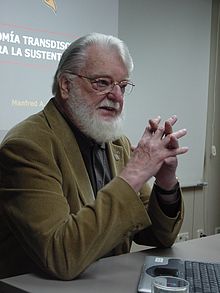Manfred Max-Neef
Manfred A. Max-Neef (born October 16, 1932 in Valparaíso ; † August 8, 2019 ) was a Chilean economist of German origin . In 1983 he was awarded the Alternative Nobel Prize " Right Livelihood Award ".
Life
Manfred Max-Neef was the son of the economist Hermann Max and Magdalene Sophie Neef, who emigrated to Chile after the First World War. Max-Neef studied at the Universidad de Chile in Santiago de Chile and graduated in industrial engineering , development economics ( Magister ) and economics ( state examination ).
First he worked for the Shell oil company . In 1957 he turned away from industry and turned to the problems of the poor in the Third World . He worked for UN organizations and taught at various universities in the USA (including the University of California, Berkeley ) and Latin America. In 1981 he founded the organization CEPAUR (Centro de Estudio y Promoción de Asuntos Urbanos). 1993 ran for the Chilean presidency and reached the fourth place with 5.55%. Most recently he was professor at the Universidad Austral de Chile in Valdivia (Chile), where he was rector from 1993 to 2001.
Inspired by Ernst Friedrich Schumacher's Small is Beautiful , he developed theses on a barefoot economy .
About development
Max-Neef saw the fundamental human needs as central for a development according to human measure (1986/1990): He postulated that development relates to people (and not to things), that an indicator for the qualitative growth of people is their quality of life that depends on the possibilities to satisfy their basic needs. He assumed a limited number of fundamental needs : subsistence, protection, affection, understanding, participation, idleness, creative work, identity and freedom. According to Max-Neef, “development” means “releasing creative possibilities” for all members, clearly differentiated from economic development.
In the 1990s, Max-Neef formulated with his hypothesis of the tipping point, the insight that from a certain point of economic development the quality of life of people decreases.
Since May 2007 he has also been an official member of the World Future Council and campaigned for the rights of future generations.
honors and awards
- Right Livelihood Award (1983)
- Doctor in Economics hc , University of Jordan
- University Award of Highest Honor, Sōka University , Japan
- National Prize for the Promotion and Defense of Human Rights, Chile
Memberships
- Club of Rome (until 2003 Active Member, since then Honorary Member )
- European Academy of Sciences and Arts
- New York Academy of Sciences
- Leopold Kohr Academy of the Tauriska Association
- EF Schumacher Society
- World Future Council
Works (selection)
- In torno a una sociología del desarrollo. Univ. Nacional Mayor de San Marcos, Lima 1965
- Desarrollo a escala humana. One option for the future. CEPAUR, Santiago de Chile; Dag Hammarskjöldstiftelsen, Uppsala 1986
- Together with Antonio Elizalde and Martín Hopenhayn: Development on a human scale. An option for the future. Translated from the Spanish by Norbert Rehrmann and Horst Steigler. CEPAUR, Santiago de Chile; Gesamtthochschulbibl., Kassel 1990 (Development Perspectives, 39)
- English: Human Scale Development
- From the outside looking in. Experiences in “barefoot economics”. Zed Books, London and New Jersey 1992
literature
- Literature by and about Manfred Max-Neef in the catalog of the German National Library
- Gerhard Drekonja-Kornat : Manfred A. Max-Neef (* 1932). Development on a human scale. In: German Foundation for International Development (Ed.): D + C Development and Cooperation , July / August 2001, pp. 233–235
Web links
- The Right Livelihood Foundation mourns its first Latin American Laureate, Manfred Max-Neef. In: rightlivelihoodaward.org. August 8, 2019(English).
- Reiner Metzger: "The poor are tremendously creative". In: taz.de . March 12, 2005 (interview with Manfred Max-Neef and others).
- derstandard.at June 16, 2005: "Weapon of mass destruction" neoliberalism
Individual evidence
- ^ Fallce el destacado ecologista Manfred Max Neef. In: Diario UChile. August 8, 2019, accessed August 9, 2019 (Spanish).
- ^ Daniel Gad: The Art of Development Cooperation: Concepts and Programs of a Foreign Cultural Policy of Nordic Countries , Springer-Verlag, 2014, ISBN 978-3-658-05446-5 , p. 62 .
- ^ Manfred A. Max-Neef, Antonio Elizalde, Martin Hopenhayn: Human Scale Development: Conception, Application and Further Reflections. (pdf, 847 kB) Apex Press, New York / London, 1991, ISBN 0-945257-35-X , archived from the original on February 15, 2010 (English).
-
↑ dhf.uu.se: pdf ,
Manfred A. Max-Neef: From the Outside Looking In: Experience in 'barefoot economics'. (pdf, 8.3 MB) Zed Books, London / New Jersey, 1992, ISBN 1-85649-187-0 , archived from the original on November 22, 2010 (English). -
↑ online ,
Gerhard Drekonja-Kornat : Manfred A. Max-Neef (* 1932): Development on a human scale. In: D + C - Development and Cooperation (No. 7/8, July / August 2001). Pp. 233–235 , archived from the original on November 10, 2012 .
| personal data | |
|---|---|
| SURNAME | Max-Neef, Manfred |
| ALTERNATIVE NAMES | Max-Neef, Manfred A. |
| BRIEF DESCRIPTION | Chilean economist |
| DATE OF BIRTH | October 16, 1932 |
| PLACE OF BIRTH | Valparaíso |
| DATE OF DEATH | August 8, 2019 |
